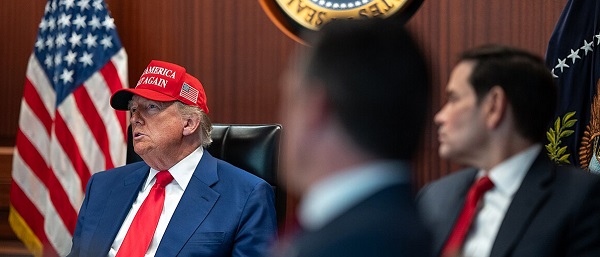Daily Caller
Mass Deportations, Cracking Down On Sanctuary Cities And More: Here’s What Trump Has In Store For Immigration

 From the Daily Caller News Foundation
From the Daily Caller News Foundation
President-elect Donald Trump will immediately crack down on border security and interior immigration enforcement upon his return to office, immigration experts and other allies of the upcoming administration say.
Trump decisively won re-election to the White House, having secured 295 electoral votes and drawing more than 73 million supporters to the voting booth on Election Day, per the latest results as of Friday. The victory brings into sharper focus his campaign platform, which includes incredibly hawkish border security proposals.
The president-elect, who already established himself as a stalwart on border enforcement during his first term in office, made a slate of campaign promises on border security over the past year, such as completing the U.S.-Mexico border wall, reviving the Remain in Mexico program, bringing back the travel ban and hiring more Border Patrol agents.
Trump also introduced a number of more novel pledges while on the campaign trail, such as a vow to conduct the “largest deportation program in American history” and a plan to end birthright citizenship for those born on American soil by illegal migrant parents.
Trump’s rhetoric and past reputation may have already helped mitigate the immigration crisis at the U.S.-Mexico border. Upon hearing that he was elected to a second term, numerous migrants in southern Mexico expressed hopelessness and opted to leave a U.S.-bound caravan they were traveling in, with a Mexican official noting that the incoming caravan of roughly 3,000 migrants shrunk by roughly half its size after Trump declared victory.
Immigration experts who spoke with the Daily Caller News Foundation, while cautioning that anti-borders groups will fight the upcoming administration tooth and nail, said the American people can certainly expect a return to the tough immigration measures that were seen in Trump’s first term.
“America can expect the new Trump administration to do what the prior Trump Administration did: To apply the Immigration and Nationality Act, as written by Congress. And to restore the rule of law, both to the Southern border and to the legal immigration system,” said Matt O’Brien, investigations director at the Immigration Reform Law Institute (IRLI), a conservative legal group in Washington, D.C., that pushes for stricter immigration policies.
“The overall goal will be protecting the public safety and national security of the United States; as well as protecting migrants — especially vulnerable women and children — from exploitation by smugglers and traffickers,” O’Brien continued. “The only thing that needs to be done to ‘fix’ the immigration system is to use the laws on the books as Congress intended. And President Trump will do that.”
As for laws set by Congress, several lawmakers in the House and Senate told the DCNF that they are ready and waiting with their own legislation once Trump re-enters the Oval Office.
Texas GOP Sen. Ted Cruz, for example, said he looks forward to passing his Justice for Jocelyn Act in the next Congress, an homage to a 12-year-old Houston girl who was allegedly sexually assaulted and murdered in June by two illegal migrants. The bill would mandate the Department of Homeland Security (DHS) to “exhaust all reasonable efforts” to keep an illegal migrant in custody before releasing them into the interior of the country, according to the legislation.
Should an illegal migrant be released, however, the legislation would call for continuous GPS monitoring until their removal from the U.S. or the completion of their immigration proceedings. Texas GOP Rep. Troy Nehls has sponsored the same legislation on the House side.
“In a second Trump administration, the House Committee on Homeland Security will do everything possible to help the United States return to an era of secure borders and robust interior enforcement,” GOP Rep. Mark Green, who serves as chairman of the House Homeland Security Committee, stated to the DCNF. “Ending the Biden-Harris border crisis will require two things — policy changes to end the flow of inadmissible aliens into our country, and more funding for interior enforcement to demonstrate that there are consequences to entering illegally.”
The election results so far show Congress will likely be in a position to support the upcoming Trump administration’s immigration agenda. The GOP secured control of the Senate after flipping four different Senate seats, and while there is no definitive winner of the House majority yet, Republicans appear to have a slight edge as votes continue to trickle in.idential nominee U.S. Sen. JD Vance (R-OH) tours the U.S. Border Wall on August 01, 2024 in Montezuma Pass, Arizona. (Photo by Anna Moneymaker/Getty Images)
While it’ up for debate on exactly what bills Trump ultimately signs into law or executive orders he takes, it’s certain that the incoming president will face courtroom fights over whatever he decides to do.
“Any action that President Trump would take, someone is going to sue,” Eric Ruark, research director for NumbersUSA, stated to the DCNF about the expected barrage of court challenges the Trump administration will receive once it embarks on its immigration agenda. “It depends on whether you find a judge that will rule against him, and it may take a long time for these things to play out.”
The American Civil Liberties Union (ACLU) filed more than 400 legal actions against Trump and his administration since 2016, according to their count, and these lawsuits targeted a vast number of his first term’s immigration priorities. The massive liberal organization, and others like it, say they’re ready to battle the Republican again now that he will be returning to office.
Even President Joe Biden, who entered office on a pledge to undo Trump’s hawkish border policies, was sued by immigrant rights groups when he finally attempted to end the illegal immigration crisis by issuing an executive order in June that largely shut down crossings at the southern border.
The Biden-Harris administration oversaw record-levels of border encounters during its time in office, with illegal border crossings in fiscal year 2023 and fiscal year 2024 being the worst in history, according to CBP data. The border crisis began after the administration in its first year took nearly 90 executive actions that specifically targeted Trump’s first-term immigration policies.
While some of Trump’s more ambitious goals will take time and likely endure legal challenges, there are swift administrative actions that the president-elect will likely take on day one of his administration, Ruark noted.
“Ending the parole abuse,” he said, referring to the CHNV program and others like it that have paroled into the U.S. more than half a million foreign nationals during the Biden administration. Around 530,000 Cubans, Haitians, Nicaraguans and Venezuelans have been flown into the country under the CHNV initiative.
“On day one I think he would end those parole programs,” Ruark said. “And people who come in under parole were being allowed — and I guess they still are — to sponsor other people to come in, which is a complete violation of the law. So that is something Trump can end on day one.”
He also listed the termination of the CBP One app — which has allowed roughly one million foreign nationals to schedule appointments at ports of entry since it was first rolled out — and the withholding of federal funds from sanctuary cities as other unilateral actions that Trump will likely embark on immediately.
A successful immigration agenda will also hinge in large part on cooperation from Mexico, which stands in between the U.S. southern border and the countless illegal migrants who wish to cross it every year. The former Mexican president, Andres Manuel Lopez Obrador, ramped up his government’s crackdown on U.S.-bound illegal migration, giving relief to Biden as he dealt with historic border encounters.
Claudia Sheinbaum, Lopez Obrador’s successor, took office in October, but questions remain on how the leftist Mexican leader will get along with Trump. Sheinbaum on Thursday confirmed that she had a “cordial” phone call with the president-elect following his victory, but did not go into further detail on what was discussed. A spokesperson for Trump’s campaign declined to comment on what was said during the phone call when reached by the DCNF.
Regardless of legal pushback by liberal organizations or a lack of cooperation from his Mexican counterparts, immigration experts do anticipate Trump to be even tougher on immigration than he was in his first term.
“I would be surprised and very disappointed if not,” Ruark said.
Daily Caller
Trump Reportedly Planning Ground Troops, Drone Strikes On Cartels In Mexico


From the Daily Caller News Foundation
The U.S. is reportedly planning to send troops and intelligence officers into Mexico to target drug cartels, former and current U.S. officials told NBC News Monday.
Training has reportedly already begun for such a mission, two current U.S. officials told NBC News, though no deployment to Mexico is imminent. The plan would deploy both U.S. military and CIA personnel on the ground in Mexico and include drone strikes on cartel targets, according to the report. If put into action, it would be a significant escalation in President Donald Trump’s ongoing campaign against Latin American drug cartels.
“The Trump administration is committed to utilizing an all-of-government approach to address the threats cartels pose to American citizens,” a senior administration official told NBC in response to the news.
Dear Readers:
As a nonprofit, we are dependent on the generosity of our readers.
Please consider making a small donation of any amount here.
Thank you!
If the mission is approved, the administration reportedly plans to keep the operation secret and not publicize any strikes, unlike the video-documented attacks on cartel boats in the Caribbean and Pacific that Trump has highlighted in the past, according to the report.
The plan calls for drone strikes against drug labs in Mexico as well as top cartel leaders, the officials told NBC News, and is not intended to undermine the Mexican government.
The U.S. troops will reportedly mostly be Joint Special Operations Command (JSOC) members, who operate under the authority of the intelligence community, two current officials told NBC News. Pat administrations have deployed the CIA to aid in missions against cartels from the Mexican government, but have never gotten involved directly as the reported plan prescribes.
The CIA and the White House did not immediately respond to the Daily Caller News Foundation’s request for comment.
Business
Trump’s Tariffs Have Not Caused Economy To Collapse


From the Daily Caller News Foundation
By Mark Simon
The APEC Summit in Korea last week marked a pivotal moment for U.S. trade policy, delivering tangible wins for American interests. Solid deals were struck with South Korea, while the U.S. and China de-escalated their long-simmering trade war—a clear positive for President Trump. In the chaotic world of Donald Trump, such normalcy disappointed the news media and foreign policy pundits, who grumbled that the event lacked the drama of a disaster.
Yet, as Trump departed Busan, a deeper transformation unfolded, largely overlooked by observers. In just two days, President Trump orchestrated the most significant shift in U.S. trade strategy since China’s 2001 entry into the World Trade Organization (WTO).
The real triumph? Widespread acceptance by Asian trading partners of U.S. tariffs as a cornerstone of a reimagined American economic model. This acceptance dismantles nearly a century of unwavering belief in low tariffs as the unassailable path to global prosperity.
Trump’s tariff approach disrupts the post-World War II global trading system, particularly the U.S.-championed free-trade orthodoxy embraced by both parties for over 50 years. By wielding tariffs effectively, Trump challenges the free-market gospel enshrined in the WTO and echoed by World Economic Forum elites and corporate-sponsored Washington think tanks like AEI and CATO, which decry tariffs as heresy.
At APEC, there was no fiery backlash—only quiet nods to moderate tariffs as fixtures in the evolving economic order. Leaders from across the Asia-Pacific assessed the tariffs’ impacts and moved forward without spectacle, signaling a pragmatic pivot toward Trump’s view of international commerce.
Historically, tariff reductions in Asia stemmed from U.S. pressure to open markets. Mercantilist instincts run deep in most Asian governments—except in freewheeling Hong Kong and Singapore. These nations, built on exports inside protected markets, grasp how tariffs can revitalize U.S. manufacturing and bolster federal revenue. Unlike America’s one-sided openness to Asian imports, Trump’s reciprocity feels like overdue fairness.
As a former free-market purist who once decried tariffs, I initially missed their nuance in Trump’s arsenal. Tariffs impose costs, but the genius lies in offsetting them strategically. Trump’s aggressive deregulation, sweeping tax reforms, and drive for rock-bottom domestic energy prices mitigate burdens and generate a net economic surge—one that Asian leaders implicitly endorsed.
This “internal free-market trio” forms the bedrock of the new U.S. paradigm: moderate tariffs generate revenue and incentivize factory repatriation; deregulation slashes red tape; tax cuts keep capital flowing competitively; and abundant, cheap energy undercuts foreign advantages.
Together, they magnetize global investment, upending a century of free-trade dogma. Energy dominance is key. Through promotion of domestic oil, gas, and renewables, Trump has driven U.S. energy costs 30–50% below those in Europe or much of Asia. For capital-intensive sectors like steel, semiconductors, and electric vehicles, this is structural superiority, not subsidy. Layer on the 2017 Tax Cuts and Jobs Act—slashing the corporate rate to 21% and allowing immediate capital expensing—and the math tilts toward U.S. production. Tariffs may raise import prices by 20–30%, but deregulation accelerates cost-cutting, while energy savings absorb part of the hit.
Critics claim tariffs ravaged the economy post-2018, but COVID-19, not tariffs, triggered the downturn. Trump’s initial round was a successful pilot, extended by Biden—yet without Trump’s deregulation and energy surge, the tariffs became un-offset weight. Blanket cost hikes under Biden stifled growth; Trump’s selective offsets ensure expansion.
America’s edge sharpens as rivals falter. Europe, shackled by leftist policies, environmental mandates, and the Ukraine quagmire, hemorrhages capital to the U.S. In North Asia—China, Korea, Japan, Taiwan—demographic headwinds make investments unappealing compared to North America’s burgeoning market. Aging populations and shrinking workforces amplify this disparity.
APEC underscored America as a vibrant, tariff-protected haven primed for onshoring. Amid Asia’s labor crunch, nations view the U.S. as an investment beacon, mirroring Japan’s model: a high-value exporter offloading low-end manufacturing while retaining competitiveness. Summit chatter revealed minimal tariff gripes. China voiced tepid concerns over escalations, but these seemed rhetorical—testing boundaries rather than igniting conflict.
To free-trade zealots, Trump’s heresy is demolishing sacred economic theory. Past protectionists erred by isolating tariffs without cost-lowering measures. Trump integrates them: selective duties paired with deregulation, technological leaps, and economic decentralization beyond urban centers.
In equilibrium, tariffs harvest revenue and reclaim jobs, capitalizing on America’s fiscal and regulatory advantages. Trump’s blueprint restores balance to free trade, honoring national sovereignty while exposing borderless markets’ perils. It proves moderated protectionism can ignite growth, spur innovation, and draw capital—heralding a bolder, self-reliant American century.
Mark Simon is former group director for Next Digital, parent company for Apple Daily, the leading pro-democracy newspaper in Hong Kong until it was forced to close in 2021.
-

 Business1 day ago
Business1 day agoTrump’s Tariffs Have Not Caused Economy To Collapse
-

 Daily Caller1 day ago
Daily Caller1 day agoTrump Reportedly Planning Ground Troops, Drone Strikes On Cartels In Mexico
-

 Daily Caller2 days ago
Daily Caller2 days agoNigeria Would Welcome US Intervention In Massacre Of Christians By Islamic Terror Groups
-

 Alberta21 hours ago
Alberta21 hours agoAlberta government’s plan will improve access to MRIs and CT scans
-

 Alberta2 days ago
Alberta2 days agoCanada’s heavy oil finds new fans as global demand rises
-

 Bruce Dowbiggin2 days ago
Bruce Dowbiggin2 days agoA Story So Good Not Even The Elbows Up Crew Could Ruin It
-

 Addictions2 days ago
Addictions2 days agoThe War on Commonsense Nicotine Regulation
-

 Censorship Industrial Complex2 days ago
Censorship Industrial Complex2 days agoPro-freedom group warns Liberal bill could secretly cut off Canadians’ internet access









